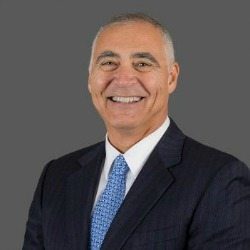
Al Grasso has spent a lifetime working with complex scenarios, but the value of complexity for its own sake can be overrated and costly, he said.
“Simple thoughts take a lot of work and effort to prepare,” he said, speaking at a TEDx talk in Tysons, Virginia. “It is really hard to get to easy things.”
Since 2006, Grasso had headed nonprofit science and engineering research organization The MITRE Corp. as president and CEO. He stepped down March 6, ending the major part of a career that began there in 1986. He remains on the board of trustees.
More than 50 years ago, Grasso told his audience as an image of a warehouse-sized computer filled the screen behind him, MITRE was working on the first real-time digital computer. Flash forward to just a few years ago, when the same organization in partnership with Harvard University built the first nano-scale computer, a wraith of the original machine.
“The key point here is there’s a lot of complexity that goes behind making something look very, very simple,” Grasso said.
Life is replete with examples of perfection in the simple. It’s in nature, art, science, narrative, prose.
“But don’t let that fool you,” Grasso said. “It took a lifetime of accomplishment for Albert Einstein to simplify the theory of relativity to the three different variables that you see here. It takes an incredible level of complexity for a flower to grow—to have the right soil, the right pollination, the right irrigation. It takes an artist years to create a true work of art.”
Simplicity is in business. Think IKEA furniture with its compact frames and simple hardware, or warehouse club Costco that carries inventories of around 4,000 types of items per store versus 40,000 or more in a typical supermarket.
“Complexity is very, very costly,” Grasso added.
Early in his career as an electrical engineer, he said, he was tasked with designing some amplifiers. He spent weeks perfecting his work and making it as precise as he’d been trained to do in school. His manager was not impressed. It might have earned him an A in school, he said, but the parts Grasso used would cost hundreds of thousands of dollars when there was another model that cost only $10.
“We’re trained to make things much more complex than we need to be,” Grasso said.
A large percentage of Americans complain the tax code is too complicated, he went on, and more than eight out of 10 depend on tax professionals or software to help them complete their income taxes. With a tax code that encompasses thousands of pages and grows by the year, a $193 billion industry has evolved just to try to keep everyone compliant, he said.
“And in the end, what does it provide?” Grasso said. “Well, in 2001, the tax gap, which is the amount of money that the government is expected to collect versus the amount of money it actually collects, was $311 billion. In 2006, it had grown to $450 billion. Perhaps the more pages we add—the more complexity we add—the most costly it gets.”
The Power Law—the idea a few things gives one access to many things—is a key to simplifying, he said. For example, there are billions of websites on the internet, but most people routinely use only a select few to access the others—Google to get to anywhere, Amazon to connect to sellers, Facebook for social information.
The Power Law has practical applications everywhere. One of MITRE’s projects over the years was to help the military connect its many communication systems.
“Eighty-five percent of what they were trying to do was trying to tell the other person where they were, when they were there, and who they were,” Grasso said. “We were able to connect thousands of systems that before were not able to talk to each other … just by focusing on those three elements.”
Under Grasso’s his leadership, MITRE has been awarded the Secretary of Defense Medal for Outstanding Public Service, the Air Force Associations’ Theodore von Karman Award and the National Aeronautic Association’s Collier Trophy. During his last couple of years at the company’s helm, MITRE was named recognized as a top place to work in IT by Computerworld, The Boston Globe, The Washington Post, Forbes and others.
Grasso has been recognized several times as one of government contracting’s most influential leaders.
“If you’re inspired by this (idea of simplicity) at all,” Grasso said, “take the time to look at the world around you and simplify something.”
Click below to see Grasso’s TED Talk:

